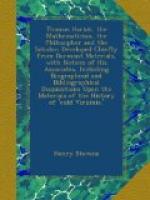All the world knows how the swift vengeance of Pedro Menendez de Aviles descended upon the unfortunate colonists of Laudonnière and Ribault and destroyed them, with very few exceptions, in September 1565. On the other hand, every one has heard how the Spaniards, almost all except the absent leader, expiated their murderous cruelty in April 1568, under the retributive justice of De Gourgues. The Spanish settlers of Florida were thus as completely exterminated by the French as the French three years before had been exterminated by the Spaniards.
After this till 1574, the Spaniards maintained possession of Florida, as far north as the Chesapeake Bay, under Menendez, who had been appointed at first Adelantado of Florida, and subsequently also Governor of Cuba. He caused an elaborate and official survey of the whole coast to be made and recorded, both in writing and in charts. Barcia tells the whole interesting story, but the charts seem to have been lost, though the description, or parts of it, remains. Menendez returned to Spain and died in 1574, just as he had been invested with the command of an ‘invincible’ armada of three hundred ships, and twenty thousand men to act against England and Flanders. All his North American acquisitions and surveys seem to have at once fallen into neglect. Not a Spanish town had been founded north of StAugustine. His Spanish missionaries sent among the Indians had gained no solid foot hold. Spain however still claimed possession, on paper, of the whole coast up to Newfoundland, though she could not boast of a single place of actual occupation.
England at this time began to see the coast clear for the spread of her protestant principles in America, and for her occupation of some of those vast countries she now professed to have been the first to discover by the Cabots. No friendly power any longer stood in her way. Her relations with Spain had settled into patriotic hatred and open war. The voyages of Hawkins and Drake into the West Indies had revealed to Englishmen the enormous wealth of the Spanish trade thither, as well as the weakness of the Spanish Government in those plundered papal possessions. Frobisher




